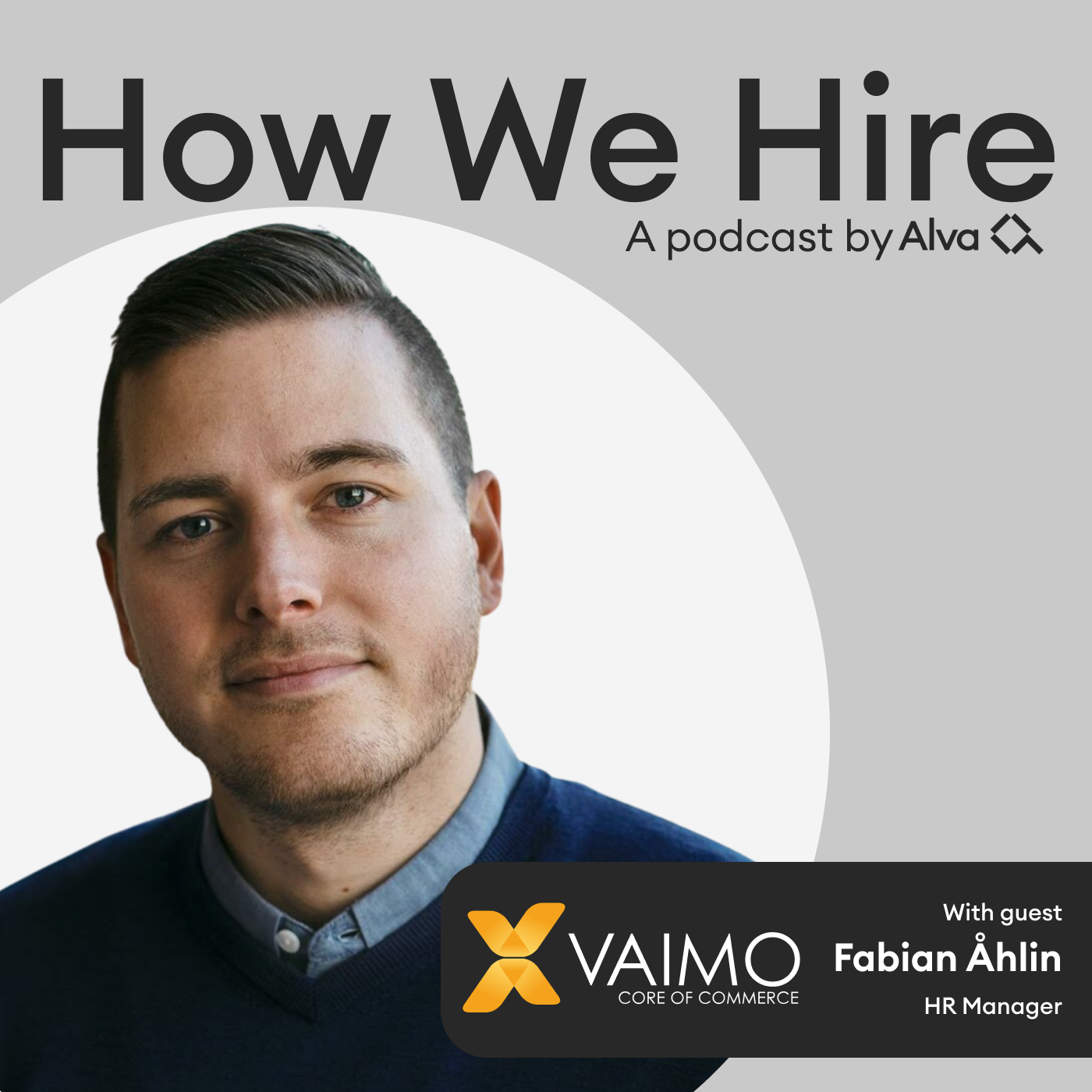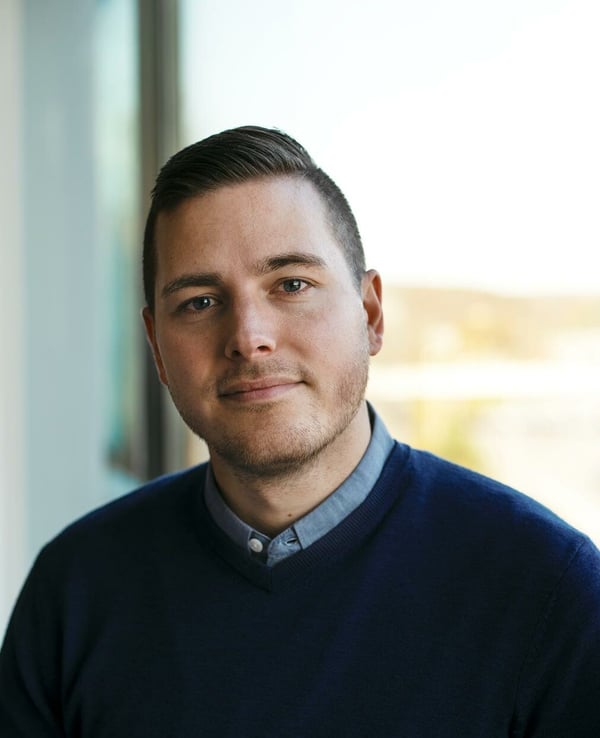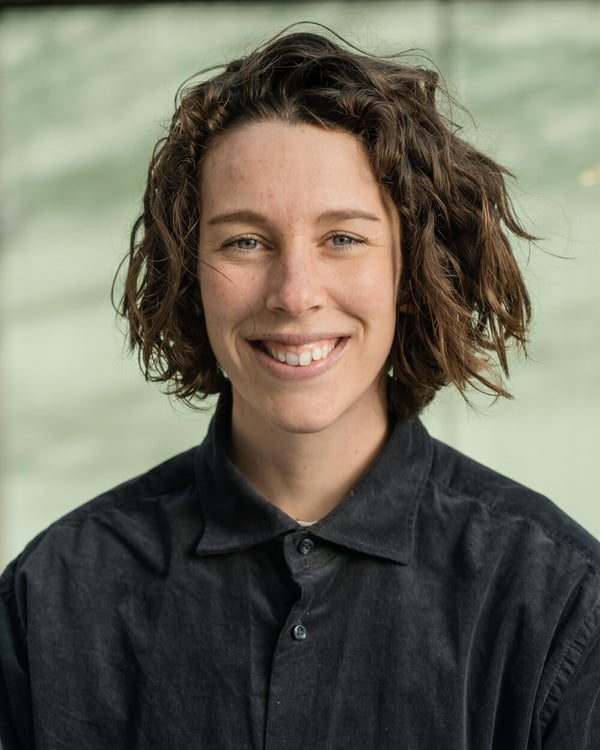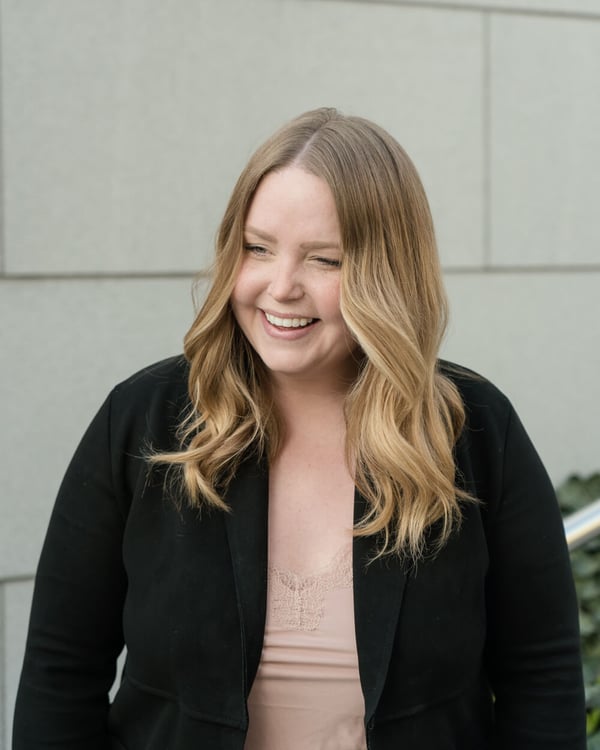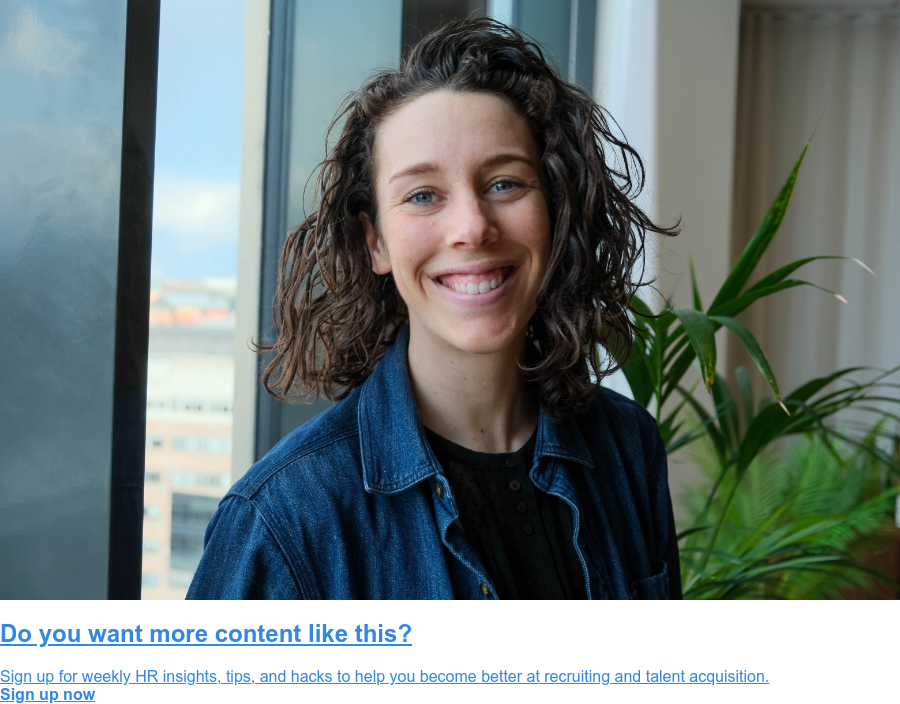Tove Hernlund (00:06):
Welcome to How We Hire, a podcast by Alva Labs with me, Tove Hernlund.
Linnea Bywall (00:11): And me, Linnea Bywall.
Tove Hernlund (00:12):
This show is for all of you who hire or just find recruitment interesting. Every episode, we will speak the thought leaders from across the globe to learn from their experiences and best practice within hiring, building teams, and growing organizations. So nice to today have Fabian here with us from Vaimo. Fabian, do you want to tell us a little bit about who you are and what you do at Vaimo currently?
Fabian Åhlin (00:47):
Sure. Super, super fun to be here. My name is Fabian Åhlin. I'm 32, married since 10 years with Sophia, who is actually also working with recruitment. We have three kids, 11, 8 and 2, so we started over again. I'm currently working as HR manager for a company called Vaimo or Vaimo Sweden, specifically, where I'm also part of the leadership team. Vaimo is an international tech company within e-commerce. So, basically, we have a lot of developers and other specialists that are making miracles for our clients that want to sell stuff online.
Tove Hernlund (01:27):
So pretty much all the most difficult roles to hire.
Fabian Åhlin (01:30):
Yeah, basically. We are about 600 experts worldwide. Within my country unit, we are 93 as of today.
Linnea Bywall (01:41):
The obvious question here is how much recruitment is discussed over the dinner table?
Fabian Åhlin (01:47):
Over the dinner table and the lunch table and the breakfast as well, recruitment is, of course, one of the main topics to discuss every day. Yeah.
Linnea Bywall (01:58):
How much have you picked up tricks from your wife and vice versa?
Fabian Åhlin (02:02):
Yeah, actually, it's quite good sometimes to say that you shouldn't be working in the same industry, but we have a lot of exchange with each other. So she's working more with staffing and also more towards public sector. I've never worked with public in that way and more with recruitment than with staffing. So, quite the same, but still differences, too, but we can definitely help each other out.
Tove Hernlund (02:29):
Super nice. I mean, Fabian, in your background, you've gone from more straightforward talent acquisition recruitment into having the broader HR perspective. How has that been for you? How's that transition been for you?
Fabian Åhlin (02:44):
Fun stories from when I was appointed, not to brag, but when I was appointed at Sweden's HR
employee of the year, a couple of years...
Linnea Bywall (02:54):
It's okay to brag. It's okay to brag.
Tove Hernlund (02:54): Say it again, say it again.
Fabian Åhlin (02:58):
Sweden's HR employee of the year. By Sweden's Association of HRM, I think, is called in English or Sveriges HR Förening in Swedish. They asked me why didn't I have a membership with Sveriges HR Förening, and my answer was, "But I'm not an HR guy. I was probably lucky to get this award." And if you would've asked me a couple of years ago, I would not have described myself as nature person because my background is more... I have a mastering in of science and business in economics, although with a focus on management and organization, but still quite far from HR in many ways. And then, I managed to sleep into recruitment during my studies. So, if anything, I would've describe myself as a talent acquisition guy. During my first 10 years-ish of my career, I've almost exclusively worked with how to attract and recruit talent to different companies, high and low wide, and then narrow, which recruitment from executive search to staffing of juniors.
Fabian Åhlin (04:05):
I worked for quite a few years as a consultant before I had opportunity to, with my lasting employer, to build up the internal-tier function, a large Swedish company in the packaging industry, BillerudKorsnäs. When you're working in-house being part of the global HR organization, you get to see and hear a lot of HR talk. It was also actually there when I had got to try out working with some stuff that wasn't just recruitment or employee branding. But, yeah, I was the person saying that I'm a specialist. I don't want to work in an HR generalist role, but that is exactly what I'm doing today. It seldom turns out actually, as you thought, but most of the times it's actually becomes even better, and that is my feeling right now that it was the right thing to do.
Linnea Bywall (04:57):
I mean, you say that you're more of a talent acquisition guy than a HR guy. What's the difference between those two personas?
Fabian Åhlin (05:05):
Those two personas, I think, is more having being the specialist, being the expert, being the super user, being the go-to person everyone goes to when they have questions about recruitment or employer branding, but it's also different because Billerud had 5,000 employees. Vaimo Sweden has 93. But still, I think it's the feeling that you are actually the best at something. But switching to HR, at least in the beginning of my new career, it's more being not... I don't feel the best at basically anything, maybe except recruitment. That's being super confident and then feeling like the expert compared to feeling like a newbie. That's maybe the big change.
Linnea Bywall (05:55):
What could you take with you from talent acquisition that has helped you in the HR space?
Fabian Åhlin (06:00):
Yeah, I think that TA is on everybody's lips, especially within HR. And if you have that kind of mindset that, I mean, being out there, being networking, connecting different people both internally and externally, internally with managers and colleagues and so on, but also externally with networking with them. I love the network. That's basically why I'm here probably. I think that working with TA makes you not an extrovert, that's the wrong word, but makes you have that in your backbone that you need to network to succeed with TA. Otherwise, it's hard to recruit that one.
Linnea Bywall (06:52):
And now, you can use that internally to interact with manager employees to get your processes last
message across.
Fabian Åhlin (07:00):
Yeah. I think that social competence is getting more... I don't think I know that it's getting more and more important. I know that Simon Sinek has talked about hard skills and not soft skills but human skills. He had some example from the Navy SEAL. They rather take someone with lower performance but higher trust than the opposite because the social competence and the trust worthiness is more important sometimes. We can see that within the tech sector, as you probably see as well, that the tech people that also have the social competence, they can go wherever they want, because they can also run client meetings, and that kind of stuff, so I think that's not just within TA. Basically, I would say that human skills is growing in importance, wherever.
Linnea Bywall (07:52):
That's a very good point. What challenges have you faced within now like the broader HR space that you weren't necessarily prepared for coming from the specialist talent acquisition role?
Fabian Åhlin (08:05):
Yeah. Where do we start? When Enrico, our global head of HR here at Vaimo, reached out to me asking if I would like to join us at Vaimo as HR for Sweden. I asked her the question, "Why are you asking me? There must be thousands of other persons with better CVs than I have for this job, because I didn't have any pure HR competence or experience from before," but I guess, she saw some kind of potentially me and she actually tried to recruit me several years ago, but I said no to her back then. I felt I couldn't say not twice, so I had accepted it.
Fabian Åhlin (08:43):
The industry that Vaimo works in e-commerce and the journey that was described felt far too interesting to [inaudible 00:08:49], so she sold it very well. I also had that bit of approach that I throw myself into underwater sometimes. There's a quote from Pippi Longstocking that it's like, "I've never tried this before, so I can definitely do it." I can recognize myself in that sometimes.
Fabian Åhlin (09:09):
But to be specific, some of the challenges I wasn't sure of where, for example, how to support managers in different conversations, work environment, rehabilitation, negotiations with unions, labor law, those kind, basically everything you don't come in contact when working with the attraction part without an acquisition. Absolutely, there have been such tasks that be involved in, and that I have zero experience from before. Vaimo already knew that. I had therefore received good support along the way. And even though labor law issues may not be what I'm most passionate about, maybe. It's...
Tove Hernlund (09:49): What? Shocking.
Fabian Åhlin (09:51):
Maybe, it's for you. And maybe it'll be for me in the future, but still extremely interesting and identifying to learn new things. I believe that what I learned now will benefit me no matter what I do later in my career. But almost starting a new career in the new industry during a pandemic was definitely a gamble in many ways and took a long time for me to decide to join Vaimo. The fact that less than a year into my employment, a war would break out, did not make the job easier because Vaimo, specifically for Vaimo, because we have 150 colleagues globally in Ukraine, specifically in Kiev and the Kharkiv.
Fabian Åhlin (10:38):
The Kiev office is doing okay. Kharkiv office doesn't longer exist due to the bombs, but in Vaimo Sweden, we only have 14 employees in Ukraine, and the rest is belonging to other country and it's in Vaimo, but of course, that was definitely nothing that I had prepared for, but we suddenly became most involved in.
Linnea Bywall (11:03):
I mean, that's obviously, as you said, nothing that you can ever prepare for, but how did HR in your
organization handle such a situation?
Fabian Åhlin (11:15):
We had a crisis plan in place quite actually long before the actually invasion.
Linnea Bywall (11:22):
Specifically around this or in just a bunch of crisis plan?
Fabian Åhlin (11:26):
No, specifically for this scenario.
Linnea Bywall (11:28): Wow.
Fabian Åhlin (11:29):
Or we had a five-scale plan where the full invasion was the highest on that scale. The Vaimo has been in Ukraine since before the Ukraine invasion as well, so they have some experience on this kind of stuff before. A war situation is, of course, not something you wish for anyone, especially not your colleagues and friends that you work with on a daily basis, but there are things that you can't control. And then it tells very much about adapting to the situation, and that I think Vaimo has done in an excellent way. It's super interesting at the same time to see what happens in a crisis situation. And if you could just replace the crisis with something nicer, that would've been better, but seeing people work together so different challenges stand up for each other, opening their homes for each other have been very inspiring.
Fabian Åhlin (12:29):
But anyway, when this unbelievable scenario occurred, we were quickly a large team of managers, HR, other employees who did everything we could to ensure the safety of our Ukrainian colleagues. Yeah, so hard to handle. At HR, we could just be there. I talked to everyone in my country unit every day, just to see the basic of your life. "What's your location? Do you need any support from us? Are you able to work?" I mean, that was not the question we asked day one, but then we need just needed to know, "Can you work?" They didn't have to, but if they could, it was good for us to know because we had to prepare rent to find other solutions otherwise to our projects.
Fabian Åhlin (13:16):
But for HR, it was more the soft. I took on just the head of being there, being supportive, asking how they are, giving sometimes some encouraging words, sometimes some jokes, some funny memes that are found just to try them to get them the spirit up. Yeah, it was hard. I cried. I'm not sure if I should say that on a podcast, especially when you heard those touching stories about deaths and then bombs and hiding, and that was tough at the start.
Linnea Bywall (13:54):
I think how do you... A, I'm super curious on what you as an organization and specifically you as an HR organization learn, but also second follow-up question is... As you said, you needed to understand if they're working. How do you staff projects on one hand business have to some extent continue, but then also having that crisis to handle? How on earth?
Fabian Åhlin (14:24):
Yeah. How on earth? We learned a lot, of course. We learned super much. If you're looking at HR, of course, HR was one of the representatives from every country unit in this an extended management team or what to call it where we met on not a daily... Yeah. I think it was even a daily basis at first, but then it got a few times a week, so we were there. We all had different Google Sheets where we had all the employees, all the locations, all this all, but at the same time, not just HR, the entire organization within Vaimo, like how we did it at day one was completely different to day 14 or even day five because we updated the process. We updated how to report, how to inform, how to communicate.
Fabian Åhlin (15:10):
On a daily basis, change has happened. Like, "No, we can't do it like this," so we need to have make this easier. And we need to add this information. We need to know if they are on the move somewhere. We need to know where they are planning to go. We need to know... So it was in that way until it didn't stabilize, but it still was not that... When people tried to, we tried to get them out of Ukraine first. That was the plan. We had the crisis plan that I mentioned in the start, was that we had a plan for people to get out of Ukraine. And we had a few people actually leaving Ukraine before the invasion, when it was getting closer, but still there wasn't a full invasion, but that's just a few people out of the 150, because you don't want to leave your family, your friends, your country, your home, if you're not 150% sure that it will actually be a war.
Fabian Åhlin (16:02):
But then when it was time, the invasion that happened already, they closed the border, so it was hard to get anyone else. We tried to get people to do Western parts. That was the goal. We actually collaborated with couple of other competitors that we usually don't collaborate with, but we did. So they had offices in Western Ukraine so that our employees could use and even sleep in if they need it. They could use our office in Poland, in Wrocław, we have an office, so they didn't have an office in Poland. So we opened up our offices for our competitors. So that was very, very touching to see that in these kind of situations. It doesn't matter if you tried to get the same projects or pitched on the same clients. You were just people, you were just humans helping each other out.
Tove Hernlund (16:55):
A really nice comment on the human part of human resources too...
Fabian Åhlin (16:59): Yeah, that's true.
Tove Hernlund (17:00): ... together.
Fabian Åhlin (17:00):
Very, very much. Also, you would increase the number of HR meetings. So instead of weekly meetings, we had basically daily meetings just to catch up. "What have you learned so far? How are you feeling? Do you need any support?" Because we also have a few HR employees that don't have a country unit their own, so they could support us in different questions. Yeah, we took it day by day basically to see, "Sometimes, I needed some support. Sometimes, I could support others," but for me, if I can just have one thing that was always on my agenda every day from the innovation was to get in contact with all my 14 colleagues in Ukraine, and I did so.
Fabian Åhlin (17:43):
And then when I didn't hear or didn't contact them every day because, yeah, it was getting more stable,
they were like, "Hi, I miss you. Why don't you do your check-in?" "Sorry, I will be better at doing my
check-in," but now it's all on a weekly basis because you are working. You have left Ukraine. It's not that... But they then started to miss my daily check-in. When it comes to recruitments in Ukraine, it's run by our center of excellence in Ukraine and Poland. They had different plans. They started to discuss with more subcontractors. I think we even gain some consultants from India, but then when we realized that our people, actually they had... We said that, "You shouldn't worry about salary. You shouldn't worry about the vacation days. You would get full salary. You would get paid no matter if you can work or not." But then when we realized that they were actually getting back to work more and more, and I think just a few weeks after, we had 80, 90 percent of the client that were back.
Fabian Åhlin (18:50):
So we realized that our employees in Ukraine, they are in the middle of innovation of a war that they want to work. And when we asked why, it was because they wanted to do something else and then just think about the war, but also that they wanted to contribute back to Vaimo because they felt that Vaimo had the giving so much to them. So they had that loyalty of, "Also, I want to give back because I know that if I can work and contribute, that will help Vaimo, which in turn will also help me and my colleagues in Ukraine." We also actually ceased the opportunity that a lot of Ukrainians were employed by companies owned by Russians or Belarus companies. They basically denied that there was enough war going on.
Fabian Åhlin (19:35):
So we had also Ukraine, skilled developers, super attractive competencies, leaving companies because they weren't even recognizing that there were going on. We actually hired new people as well because we or Ukrainians felt opposite that Vaimo is helping out. Vaimo is supporting us. Vaimo is trying to find accommodation, helping us buy the border to get our families out. They recommended us to other Ukrainians that maybe didn't feel away from their company, so we actually could get some people in as well.
Linnea Bywall (20:09):
So employer branding owns steroids and then a big crisis.
Fabian Åhlin (20:15):
Yeah. As I said, if you could take away the crisis, that would be better, but that actually has increased our EMPS quite much, or...
Tove Hernlund (20:25): Of course.
Fabian Åhlin (20:26):
Internal culture or internal values being open and so on. So, basically, we didn't have that crisis situation for that long looking at staffing of projects and so on.
Linnea Bywall (20:40):
Interesting. Yeah. I mean, this is obviously the immediate crisis might be not as extreme, but I mean, it's still ongoing, but if we still look a little bit further ahead, what's the biggest, I don't know, projects, areas that you're working on right now? What's your main focus?
Fabian Åhlin (20:59):
When you work as I do and probably as you do, then they are being responsible for HR, but for a fairly small company, you usually have to do everything possible. You work high, low, and narrow and wide, and that's both fun developing, but also sometimes a little frustrating, difficult to stay focused when you work with 12 different areas. Some things that I'm a little extra excited about right now is that, during fall, we make a big retake around our onboarding process.
Linnea Bywall (21:31): Nice.
Fabian Åhlin (21:43):
So that is something that I did at Billerud. It was a great learning from there. Of course, we have a
onboarding process today, but there is great potential for improvement.
Linnea Bywall (21:47):
What's your three biggest like, "This will be part of the onboarding process. I will die on this hill if there-"?
Fabian Åhlin (21:55):
Yeah. Good question. First, I think I need to just describe where we are to get the setting and write because we work in a super matrix organization with employees in different countries, which makes the whole thing very complex. With Billerud, it was much easier because we had the factories and you could streamline it in a quite similar way for basically everyone. But today, at Vaimo, the problem is that onboarding is all to dependent on the hiring manager. I think that some do it fantastic well and some less well.
Fabian Åhlin (22:35):
Let me take an example. We have a Polish developer that would work for country unit, Sweden. My goal is that we then have a module that is for country unit, Sweden, here get to take part in our history as a country unit, get to our clients, organization, goals, plans going forward, but we also need a module for the country and the office he or she will be working.
Linnea Bywall (23:00): Gotcha.
Fabian Åhlin (23:01):
So in this case, perhaps Wrocław in Poland, where we have office and they will go through... That module will go through the salary, benefits, vacation, access to the office and so on, very, very country specific stuff. And finally, you'd almost also have a module for the Vaimo group. So a lot of our processes are the same for everyone in Vaimo globally, values, over strategy, goals, that kind of major topics. In addition to this, the person should also be introduced to a manager and to a team who rarely sit in the same place or might not even work in the same project.
Fabian Åhlin (23:37):
And sometimes, we try to find talent elsewhere. They also need to have some kind of refresh their skills or some kind of training into the profession as well, like a new program language or something. I think that the three major we need to have as much as possible in our HR system that we use, because now we have some in the HR system, in some LMS, as far on our internet, some in the heads of the managers. So we need to have the process in place with system support. I think that's the major part. I think we also need to file alignment with all the countries, so we don't have too many exceptions because that's also previously a bit Vaimo way that, but South Africa, we don't work that in South Africa. We need to do something else.
Linnea Bywall (24:33): Gotcha.
Fabian Åhlin (24:34):
We need to align that this is a process we will actually have as a base for every country unit. And then I think we need to have managers in place manager trainings. So not just read this onboarding tutorial on the internet. We need to have trainings or mentor to really explain the pros and the cons with having a good or a bad onboarding.
Fabian Åhlin (24:58):
What I would also like is a pre-boarding. I created a pre-boarding portal with Billerud, and that was very appreciated by the employees. So when someone is hired, they send them a welcome email with access to the pre-boarding portal and not just that they need to fill in all their bank accounts and emergency contacts, that kind of pre-boarding. That's not pre-boarding, but that's a bit how the pre-boarding works today. So when I fill in my pre-board, it's like, "Yeah, pre-boarding, nice," and then I fill in, fill in, fill in, then "Thank you. See you in three months." I didn't get anything back. So I think that's important to give back content, to give back nice stories. Maybe, some interviews, some greetings, some information stuff that builds culture. It feels that, yeah, I took the right decision to actually join Vaimo.
Linnea Bywall (25:45): I mean, that's so important.
Fabian Åhlin (25:47):
Yeah. So maybe a bit fluffy, but those things I really need to have in our onboarding before being super
satisfied.
Linnea Bywall (25:57):
And I mean, if we back up the process a little bit, I mean, you are still at heart talent acquisition specialist. Even though now you have a broader role, but how does the recruitment process look like at the Vaimo? What are you most proud of?
Fabian Åhlin (26:13):
When you worked with recruitment for 10 years and not least when you in your latest role was to build up the recruitment process for a big global company, it was in a way challenging to start a job where I no longer decided under recruitment process. Of course, I still work a lot of recruitment, but the main responsibility is not mine. It's more to ensure that recruitment to Sweden are as good as possible.
Fabian Åhlin (26:41):
But if you look at how we work at recruitment at Vaimo, I think we work quite now with other tech companies, to be honest. There is a big competition for talent skill developers that can pick and choose, so you need to find your own recipe. I think these are questions every company to ask themselves, "Do we want to be a company where you can make a lot of money, you can make a career, that kind of the focus, but you also need to work much can be hard with the work-life balance part? Or do we want to be a company where we may not have the highest salaries, but we invest a lot in work-life balance in health and wellbeing in general?" It's difficult to be both.
Linnea Bywall (27:25): Yeah. Which one is you?
Fabian Åhlin (27:25): The second one.
Linnea Bywall (27:25): The second one?
Fabian Åhlin (27:30):
Yeah, we tried to work a lot on our culture, our values. I think that was shown during the war that they are actually solid. So that was definitely a test to test our values. So we want to be an open. Open is one of our values. We want to be an open and kind company that cares about our employees. We don't have the highest salaries, because it's hard to compete just with salaries, especially if you're... As we are a consultancy, where we charge by hour, we're not like a software where you have a SaaS product or whatever. We are a bit limited compared to some of our competitors. We're not the best at telling everyone or everything we do in social media. We focus more mobile internal and for branding because we believe that if we are a company with healthy values, a good culture, good people, the word of mouth will help us, which also was shown during the crisis in the Ukraine.
Linnea Bywall (28:30): Definitely.
Fabian Åhlin (28:32):
But it also means that we work a lot with actually with referrals as we-
Linnea Bywall (28:35): Nice.
Fabian Åhlin (28:36):
We know that tips from current employees are usually quite good. At least when we analyze our
recruitment sources, we can see that referrals are usually definitely the best source that we have.
Linnea Bywall (28:46):
And if someone is not working with referrals and want to get started, what would be your suggestion? How can people have a referral program from set up tomorrow?
Fabian Åhlin (29:00):
You mean other companies?
Linnea Bywall (29:01): Yeah, exactly.
Fabian Åhlin (29:03):
Oh, I think I actually discussed this with quite a few companies. We do some kind of referral bonus because I think sometimes the extra money can help people to actually think outside a box or to take that extra time to ask a friend or peers, colleague or whatever. So you need to find if you want to pay money for it, we pay, I think we have... It's a bit different, but around 1,500 euros for a hire that someone refers. And then, we have some people not in Sweden, but in other countries, I mean, a business out of this. They refer everyone from their previous companies and they were like, "We can just grab skill developers and project managers and so on."
Linnea Bywall (29:42): That's fantastic.
Fabian Åhlin (29:43):
Then that's quite cheap recruitments.
Linnea Bywall (29:45): For sure.
Fabian Åhlin (29:47):
Definitely. But I would say that you need to find your way. If you want to pay money or if you want to make a culture or a war thing during a yearly, you have maybe your year to kick off where you highlight or you want some competitions where you can see the highest scores who has referred to most people, or I think you can do it in different ways. So you need to just decide on what kind of way you want and then communicate and remind people that don't forget about it during onboarding. Especially during onboarding, when people are excited about joining and hopefully have a good impression of the company, they are extra eager to actually recommend other people.
Linnea Bywall (30:28): That's a great tip.
Fabian Åhlin (30:30):
So start early and remind people because sometimes we're just lazy, but we definitely have people that we can refer.
Linnea Bywall (30:39): So with the recruitment process, what we've talked about so far is making sure that you have a good referral program, soft onboarding and pre-boarding, but also making sure that you are clear with your comp and ben package so that you can attract the right candidates. So what happens? You have converted a candidate or referral into the process. What happens?
Fabian Åhlin (31:02):
We have, of course, different system support. We work with a good recruitment tool. I'm not sure if I
should mention them, but we-
Linnea Bywall (31:10): Go ahead.
Fabian Åhlin (31:10):
They are a few in that. We currently have Jobylon, so it's a good tool. We have the Alva as assessment partner, and I was part of implementing Alva as well here at the Vaimo. I would say we have quite a standardized. We have the screening, which I, as HR, do the first screening. And then I have some tech expert usually joining in. If it's a techy role, they need some input on. They do the second screening. After second screening...
Linnea Bywall (31:37):
Sorry, I have to dive into. What do they look for in the second screening?
Fabian Åhlin (31:41):
Then they look more into if they have the right tech case on paper. That's basically what they do. So we have a backend expert and a fronted expert that they look because sometimes the passwords or they have maybe some other tech stack that I'm not that familiar with, that they think that, but that's quite similar to what we do or that's aligned with our new multi-platform strategy. So let's try this out this first one.
Linnea Bywall (32:09): Nice.
Fabian Åhlin (32:09):
So after the screening part, we send the tests and use the test as a... That's a mandatory part of our recruitment process. And then, they come to a first interview usually with me and the hiring manager. Sometimes, we don't know who the hiring manager is. Then if someone...
Linnea Bywall (32:32): Been there, done that.
Fabian Åhlin (32:33):
Yeah. So then someone with more technology than me usually joins in. So we usually are two people.
Linnea Bywall (32:37): How come you reach that decision that you want to be two people in the first interview?
Fabian Åhlin (32:43): Because it's more from the candidate perspective. I would say my job is there to paint a big picture about Vaimo to have the corporate presentation, to tell about our values or our organization or a bit of our clients and so on and to ask the... Maybe, we shouldn't call it HR questions, but the softer questions about motivation or potential or those fun questions to ask. And then the tech person is more to or usually the hired manager usually to describe the role more from a tech point of view. This is how your job would look like on a normal daily basis. This is how the team look like. This is how you could be moving towards or career development and so on. We have a split responsibility.
Linnea Bywall (33:35):
The intent is rather to, again, convert candidates further into the funnel. Give a great candidate experience rather than we're going to assess together because we believe that will be better. So it's more candidate perspective. Yeah. I love that.
Fabian Åhlin (33:50):
More candidate perspective, a big assessment as well, but not the focus during the first interview. That's actually during the second interview, which is after the first interview, we have a tech test because that is so... Or a business case for an HR case for sales or strategy. It's more the business cases where they are doing a work sample, basically, a work test.
Linnea Bywall (34:15): Have you created those yourselves or have you...
Fabian Åhlin (34:18): Yeah.
Linnea Bywall (34:18): Okay.
Fabian Åhlin (34:21):
We have made some trial-and-error stuff trying to find a way to find a Lagom level of testing. It's not too hard, but not too easy either, but we have to take test for front and the backend. And then we have the second into with a tech expert. So if sometimes it's the same as from the first interview, but otherwise it's someone else, so have that. And then we have reference checks, which I actually sometimes are a bit concerned about. But sometimes also I think it's quite good is that we have an executive interview, so someone from the executive leadership team, so no one from Vaimo Sweden, but someone else wants to meet the candidate as the last step in the process.
Linnea Bywall (35:12):
And what would you say biggest pros and cons with that step?
Fabian Åhlin (35:15): The biggest cons is definitely to find the time. Especially when we have that looking through, recruit tech people with usually in different processes and it's like, "We just want to close this recruitment now." "No, we need to meet someone from the executive team." It's like, "Okay, who can do it?" "Oh, I'm based on this work." Then usually we find a lot. Yeah. But that's the big question. The big pro instead is that it's... The main purpose with why we even have, this is from a employee branding perspective that we show that you are important. Even the executive team, even though we are 600 employees, they want to meet every new employee to tell a person about the culture, values, that kind of more softer values.
Linnea Bywall (36:09):
I think that's fantastic to have that commitment. I see how the stress from the TA person. I can see it in front of me, but I still think it's fantastic to have that dedication from the organization where this is so important that we will spend, I guess, a lot of time doing this.
Fabian Åhlin (36:29):
Since we do hundreds of recruitments every year, yeah.
Linnea Bywall (36:33):
Exactly. Has it ever been a show showstopper where like...
Fabian Åhlin (36:37):
Yeah, it has, but not that often. I would say it's maybe five percent of the time or something. It's more a hygiene factor that we have that as a part of the process and the executive leadership team still wants to have that as part of the process. We have discussed it several times. Since we are growing, it's really... Is this healthy? Is this sustainable to have it when we are 600, when we are 1,000, when we are 2,000? I mean, it's hard for you guys to find the time because usually the ELT members are not the ones with them with most room in their calendars.
Linnea Bywall (37:15): No, of course.
Fabian Åhlin (37:16):
Yeah, I agree that it's a nice sign of not appreciation, but you know what I mean, that we have someone from... I mean, usually, maybe it's even David, who is our CEO and co-founder. I mean, for a junior developer to actually get to meet the founder of quite big companies is quite nice.
Linnea Bywall (37:36):
We had a situation like that when we had a candidate come to the office and he didn't realize that the founder was in the room. So midway into the conversation, he asked, "Who are you?"
Fabian Åhlin (37:47): "Who are you?"
Linnea Bywall (37:48): "Oh, the CEO and founder." I guess, we should have prepared the candidate for that because he was a bit surprise and felt a bit bad afterwards, but it was...
Fabian Åhlin (37:55): I can imagine
Linnea Bywall (37:56):
It was a fun surprise, I guess. But I think it's just really interesting to hear how much you focus on
employer branding within the process. I think that's great stuff to still from that.
Fabian Åhlin (38:10):
And that's great for me to hear that you feel so because I sometimes feel like we are useless at employer branding, but I think that we actually just had a social media ambassador challenge where we tried to boost our employees to share stories to... Because we know that employee advocacy is the best way to spread the word.
Linnea Bywall (38:30): Of course.
Fabian Åhlin (38:30):
So that part, I think we need to work a bit with, but I'm glad that you feel that our internal focus is
working well, so we just need to communicate that externally.
Linnea Bywall (38:39):
Yeah, exactly. Get that message out there.
Tove Hernlund (38:42):
All right. Thank you so much, Fabian, for joining. Thank you for sharing your insights and your journey so far. Yeah, I hope all of you listening will join us again next time for another episode of How We Hire.
